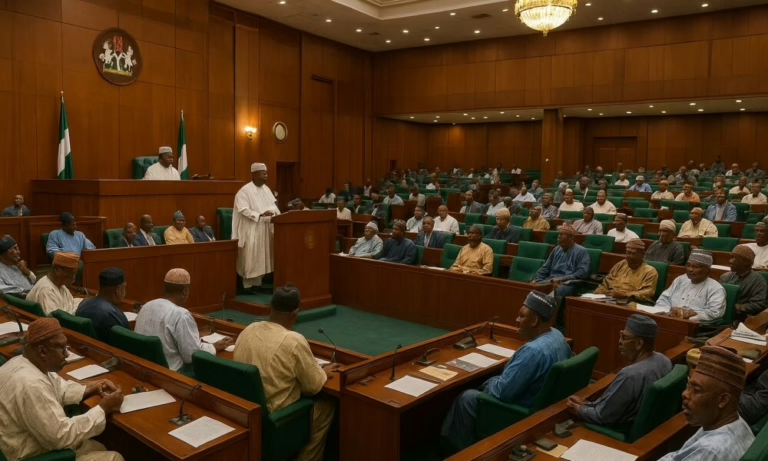Bridging the Gender Gap in Nigerian Politics: A Critical Examination
Despite women constituting nearly half of Nigeria’s population, their presence in political leadership remains disproportionately low. Currently, only 20 out of 469 members in the National Assembly are women, representing a mere 4.26%. At the state level, the situation is even more stark, with 14 state Houses of Assembly completely devoid of female legislators. This glaring underrepresentation raises urgent questions about Nigeria’s commitment to inclusive governance.
Voices from the Ground: Advocating for Reserved Seats
During a recent panel discussion, Louisa Eikhomun-Agbonkhese from Echoes of Women in Africa Initiatives in Edo State emphasized the necessity of creating additional legislative seats specifically for women. She highlighted the rarity of encountering female parliamentarians within local constituencies, often only seeing them through media coverage. The challenges faced by prominent female politicians, such as Senator Natasha Akpoti, underscore the systemic barriers women encounter in Nigerian politics.
Debating the Special Seats Bill: Diverse Perspectives
While the Special Seats Bill aims to increase women’s political participation by allocating extra seats, it has its critics. Ayisha Osori, a respected commentator on Nigerian politics, argues that such measures do not address the root causes of political exclusion. In her article No to the SSW Bill, she contends that Nigeria’s political challenges are deeply systemic and require comprehensive reforms beyond seat reservations.
Comparative Insights: Nigeria and Its African Counterparts
Nigeria’s female legislative representation lags behind several African nations that have embraced affirmative action policies. Ethiopia, for example, boasts women holding 41.3% of parliamentary seats, while the Democratic Republic of Congo has achieved 12.8%. These countries demonstrate that intentional policies can significantly enhance women’s political involvement, contributing to more balanced governance.
The Role of Media and Advocacy in Shaping the Narrative
The discourse around women’s political inclusion has evolved from mere awareness to a nuanced understanding, thanks in part to persistent advocacy and responsible journalism. Media outlets and civil society organizations have played a pivotal role in educating the public and lawmakers about the benefits of the Special Seats Bill, ensuring the conversation remains informed and constructive.
Leadership Champions: Driving Change from Within
Key political figures such as House Speaker Abbas Tajudeen and Deputy Speaker Benjamin Kalu have been instrumental in advancing the bill. Their collaboration with parliamentary allies and advocacy groups has kept the issue at the forefront of legislative priorities. The Policy and Legal Advocacy Centre (PLAC) has also been vital in sensitizing lawmakers on culturally appropriate models of seat reservation that can realistically be implemented in Nigeria.
Successful Models of Reserved Seats Across Africa
Several African countries have adopted innovative approaches to ensure women’s representation without displacing existing legislators. For instance:
- Tanzania: Allocates 30% of parliamentary seats as special seats for women, distributed proportionally among political parties.
- Uganda: Elects a Woman Representative from each district in addition to regular MPs.
- Rwanda: Reserves 24 out of 80 seats in the Chamber of Deputies for women, chosen by electoral colleges.
- Burundi: Constitutionally mandates a minimum of 30% female representation in both legislative chambers, adding seats if necessary.
- Lesotho: Appoints certain Senate seats with gender quotas alongside elected members.
These examples illustrate that well-designed reserved seat systems can effectively promote gender parity in governance.
Spotlight on Impact: Hon. Kafilat Ogbara’s Contributions
Hon. Kafilat Ogbara, representing Kosofe Federal Constituency in Lagos, exemplifies the positive impact of women in leadership. As Chair of the House Committee on Women Affairs and Social Development, she has spearheaded initiatives that empower women through scholarships and technology training. Additionally, she has championed legislation to increase female participation in national security agencies, recognizing the strategic importance of diverse representation for national stability.
Evidence Supporting Women’s Political Participation
Research from the World Bank and UN Women confirms that increased female representation correlates with enhanced economic growth, improved health outcomes, and stronger social development. Countries with more women in parliament tend to enact laws that safeguard women’s economic rights and improve public services such as education and access to clean water, benefiting society as a whole.
The Special Seats Bill: A Strategic Path Forward for Nigeria
The Special Seats Bill proposes the creation of 74 additional seats in the National Assembly and 108 in State Assemblies exclusively for women. This temporary measure includes a sunset clause, allowing for a review after 16 years or four election cycles. According to PLAC’s analysis, implementing the bill would require less than 1% of Nigeria’s national budget and under 5% of the National Assembly’s budget, making it a cost-effective reform with the potential for substantial democratic gains.
Looking Ahead: The Future of Women’s Representation in Nigeria
As the National Assembly resumes sessions in September, the Special Seats Bill is poised to enter a decisive phase. Its passage could mark a transformative moment in Nigeria’s constitutional framework, embedding gender inclusivity into the nation’s political fabric. By institutionalizing women’s representation, Nigeria stands to benefit from diverse perspectives, enhanced advocacy, and more equitable policymaking that reflects the realities of its entire population.



















0 Comments